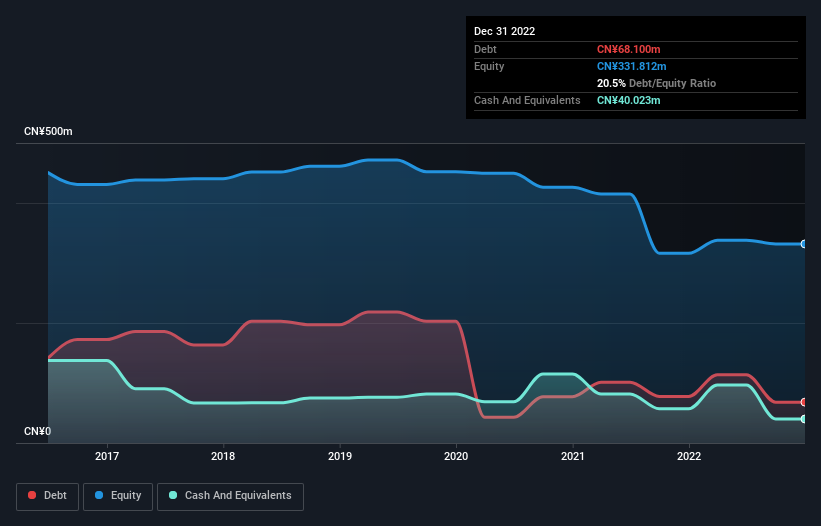David Iben put it well when he said, 'Volatility is not a risk we care about. What we care about is avoiding the permanent loss of capital.' So it might be obvious that you need to consider debt, when you think about how risky any given stock is, because too much debt can sink a company. We can see that China Jicheng Holdings Limited (HKG:1027) does use debt in its business. But is this debt a concern to shareholders?
When Is Debt A Problem?
Debt assists a business until the business has trouble paying it off, either with new capital or with free cash flow. Part and parcel of capitalism is the process of 'creative destruction' where failed businesses are mercilessly liquidated by their bankers. While that is not too common, we often do see indebted companies permanently diluting shareholders because lenders force them to raise capital at a distressed price. Of course, debt can be an important tool in businesses, particularly capital heavy businesses. The first step when considering a company's debt levels is to consider its cash and debt together.
Check out our latest analysis for China Jicheng Holdings
How Much Debt Does China Jicheng Holdings Carry?
As you can see below, China Jicheng Holdings had CN¥68.1m of debt at December 2022, down from CN¥77.7m a year prior. On the flip side, it has CN¥40.0m in cash leading to net debt of about CN¥28.1m.

How Strong Is China Jicheng Holdings' Balance Sheet?
We can see from the most recent balance sheet that China Jicheng Holdings had liabilities of CN¥136.3m falling due within a year, and liabilities of CN¥315.0k due beyond that. On the other hand, it had cash of CN¥40.0m and CN¥195.1m worth of receivables due within a year. So it actually has CN¥98.5m more liquid assets than total liabilities.
This surplus strongly suggests that China Jicheng Holdings has a rock-solid balance sheet (and the debt is of no concern whatsoever). With this in mind one could posit that its balance sheet means the company is able to handle some adversity. When analysing debt levels, the balance sheet is the obvious place to start. But you can't view debt in total isolation; since China Jicheng Holdings will need earnings to service that debt. So when considering debt, it's definitely worth looking at the earnings trend. Click here for an interactive snapshot.
Over 12 months, China Jicheng Holdings reported revenue of CN¥354m, which is a gain of 16%, although it did not report any earnings before interest and tax. That rate of growth is a bit slow for our taste, but it takes all types to make a world.
Caveat Emptor
Over the last twelve months China Jicheng Holdings produced an earnings before interest and tax (EBIT) loss. Indeed, it lost a very considerable CN¥40m at the EBIT level. That said, we're impressed with the strong balance sheet liquidity. That will give the company some time and space to grow and develop its business as need be. The company is risky because it will grow into the future to get to profitability and free cash flow. The balance sheet is clearly the area to focus on when you are analysing debt. But ultimately, every company can contain risks that exist outside of the balance sheet. To that end, you should learn about the 4 warning signs we've spotted with China Jicheng Holdings (including 2 which are a bit unpleasant) .
When all is said and done, sometimes its easier to focus on companies that don't even need debt. Readers can access a list of growth stocks with zero net debt 100% free, right now.
New: AI Stock Screener & Alerts
Our new AI Stock Screener scans the market every day to uncover opportunities.
• Dividend Powerhouses (3%+ Yield)
• Undervalued Small Caps with Insider Buying
• High growth Tech and AI Companies
Or build your own from over 50 metrics.
Have feedback on this article? Concerned about the content? Get in touch with us directly. Alternatively, email editorial-team (at) simplywallst.com.
This article by Simply Wall St is general in nature. We provide commentary based on historical data and analyst forecasts only using an unbiased methodology and our articles are not intended to be financial advice. It does not constitute a recommendation to buy or sell any stock, and does not take account of your objectives, or your financial situation. We aim to bring you long-term focused analysis driven by fundamental data. Note that our analysis may not factor in the latest price-sensitive company announcements or qualitative material. Simply Wall St has no position in any stocks mentioned.
About SEHK:1027
China Jicheng Holdings
Manufactures and sells POE umbrellas, nylon umbrellas, and umbrella parts in the People’s Republic of China.
Excellent balance sheet with acceptable track record.
Market Insights
Community Narratives



